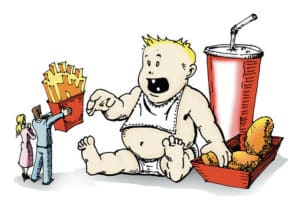
Yesterday’s post reflected on a sad fact that all humans eventually must face. Only three things can be changed: other people, the environment, and the self. Parents can effect a modicum of authority by manipulating the environment; for instance, by maintaining the home free of high-calorie snacks, or at the very least, by keeping such commodities under lock and key. They might change the school environment by campaigning against lunch policies, or traditions that allow birthday treats to be brought in; or by influencing the administration either for or against school weigh-ins.
Other people are the most stubborn challenge. In the case of parents who want to help their children avoid obesity, those wrong-headed opponents may be relatives, medical personnel, teachers, neighbors, and additional walk-on players who seem to need a talking-to, from time to time. Too frequently, however, the kids themselves prove to be the subset of “other people” most adamantly resistant to the introduction of novelty into their accustomed routines.
After enough incidents of running head-first into the wall of the environment or the other people, many parents eventually catch on, and internalize the message that what needs to change is their very own personal selves.
Let’s look at some thoughts that have been voiced and recorded about the role of parents in their children’s recovery. In “I Ruined You Before You Were Three,” a heartbreaking piece permeated with dry humor, Caroline Beaulieu addresses her daughter:
I promise you that every day we wake up wanting to make you better, even if that means doing the hard work of making ourselves better… Someday you’ll love someone so much you’ll ruin them too. And I only hope I’m still around so we can have a beer and laugh about how hard it is to love someone so much.
The grittier Anne Lamott wrote…
[…] one of the worst things about being a parent, for me, is the self-discovery, the being face to face with one’s secret insanity and brokenness and rage.
The thing is, a lot a angst can be avoided by starting early and being consistent, exercising parental prerogatives with a steady hand and a light touch. If food is never used to buy love, it’s a lot easier to keep kids from getting hooked on overeating. Dr. Pretlow says,
Controlling a preschooler’s access to food by parents is effective to prevent childhood obesity, if the parent is willing to not enable overeating in the child (no treats, no large portions, no extra helpings, etc.). This doesn’t work once the child is mobile (bike, friend’s houses, etc.), about age 10.
Hopefully, by that time, there will be enough good training in place that it will stick, even when the child is not constantly beneath the parental eye. At the same time, while maintaining expectations, a parent can’t be fanatical, because that may stir up pushback and backlash and all kinds of unpleasant sequelae.
There is a reaction called “last supper” syndrome, says registered dietician and nutritionist Carrie Dennett, the implication being that the person feels desperately needy, as if they will never again have a chance to eat this particular food, or indeed any food at all. If the really yummy stuff is too vigorously restricted, the next step might be obsession, which is certainly a form of emotional eating.
When the Berlin Wall between a person and a forbidden food is breached, shame and guilt can follow, compounding the emotional mess even more. Dennett says,
Make desserts and other favorite treat foods available on occasion, and let your child choose them when they are available. Healthful diets still have room for treats.
Your responses and feedback are welcome!
Source: “I Ruined You Before You Were Three,” Medium.com, 08/31/16
Source: “Duncan Trussell Family Hour 301: Anne Lamott and Raghu Markus,” iHeart.com, 08/16/18
Source: “What to say (or not to say) to your overweight child,” WashingtonPost.com, 09/13/16
Photo credit: Joe_13 on Visualhunt/CC BY-ND

 FAQs and Media Requests:
FAQs and Media Requests: 











